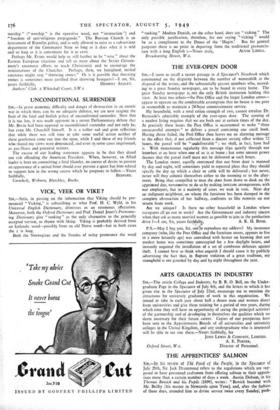THE EVER-OPEN DOOR
seem to recall a recent passage in A Spectator's Notebook which commented on the disparity between the number of womenfolk at the disposal of the writer, and the substantially greater numbers who, accord- ing to a great Sunday newspaper, are to be found in every home. The great Sunday newspaper is,not the only British institution holding this view. At least two others-a-the Post Office and the larger London stores— appear to operate on the comfortable assumption that no house is too poor in womenfolk to maintain a 24-'hour commissionaire service.
My household, with a total ration strength of two, cannot emulate Dr. Barnardo's admirable example of the ever-open door. The earning of a modest living requires that we are both out at certain times of the day. At precisely these hours the Post Office is accustomed to make " three unsuccessful attempts" to deliver a parcel containing one small book. Having thrice failed, the Posi Office then leaves me an alarming message to the effect that, if not collected from a distant sorting office within 72 hours, the parcel will be " undeliverable " ; we shall, in fact, have had it. With monotonous regularity this message slips quietly through our letterbox at an hour when one of us is at home ; but some unseen power decrees that the parcel itself must not be delivered at such hours.
The London stores, equally convinced that our front door is manned by day and night, will sometimes yield to repeated pleas that they should specify the day on which a chair or table will be delivered ; but never, never will they commit themselves either to the morning or to the after- noon. Being thus compelled to man the door from dawn to dusk on the appointed day, wrcontrive to do so by making intricate arrangements with eur employers, but in a majority of cases we wait in vain. Next day an indignant neighbour, on whom the furniture has been dumped to the complete obstruction of her hallway, confronts us like nemesis on our return from work.
Are we unique? Is there no other household in London whose occupants all go out to work? Are the Government and industry sincere when they ask as many married women as possible to join in the production
P.S.—May I beg you, Sir, noel.° reproduce my address? My insurance company (who, like the Post Office and the furniture stores, appears to live in a more leisurely age) was convulsed with horror on learning that our modest home was sometimes unoccupied for a few daylight hours, and instantly required the installation of a set of cumbrous defences against theft. I cannot heir to think what anguish I should cause it by publicly advertising the fact that, in flagrant violation of a great tradition, my stronghold is not gaardcd by day and by night throughout the year.


































 Previous page
Previous page